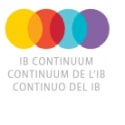Sciences
“The scientific mind does not so much provide the right answers as asks the right questions.”
Strauss
With
inquiry at the core, the MYP sciences framework aims to guide students
to independently and collaboratively investigate issues through
research, observation and experimentation. The MYP sciences curriculum
must explore the connections between science and everyday life. As they
investigate real examples of science applications, students will
discover the tensions and dependencies between science and morality,
ethics, culture, economics, politics and the environment.
Scientific
inquiry also fosters critical and creative thinking about research and
design, as well as the identification of assumptions and alternative
explanations. Students should learn to appreciate and respect the ideas
of others, gain good ethical-reasoning skills and further develop their
sense of responsibility as members of local and global communities.
Learning
science involves more than simply learning technical terminology. The
MYP considers all teachers to be language teachers and thus, MYP
sciences should enable students to access, use and communicate
scientific knowledge correctly and confidently in oral, written and
visual modes.
All IB programmes share common beliefs and values about teaching and learning science:
- International dimension: Students develop an appreciation that science requires open-mindedness and freedom of thought transcending gender, political, cultural, linguistic, national and religious boundaries.
- Aesthetic dimension: Students engage with the complexities, intricacies and beauty of science, which arouses their curiosity and heightens their learning.
- Ethical dimension: Students reflect on the ethical, social, economic, political, cultural and environmental implications of using science to solve specific problems. Students develop a personal, ethical stance on science-related issues.
- Learning through investigation: Students construct meaning by designing, conducting and reflecting on scientific investigations. The scientific process, which encourages hands-on experience, inquiry and critical thinking, enables students to make informed and responsible decisions, not only in science but also in other areas of life.
- Collaboration: Students are provided opportunities to work individually and with their peers to learn about science within and beyond the classroom. They develop safe and responsible working habits in practical science. The IB learner profile provides a strong foundation for teaching and learning science in IB programmes and is integral to its successful application.
The aims of MYP sciences are to encourage and enable students to: understand and appreciate science and its implications consider science as a human endeavour with benefits and limitations. cultivate analytical, inquiring and flexible minds that pose questions, solve problems, construct explanations and judge arguments develop skills to design and perform investigations, evaluate evidence and reach conclusions. build an awareness of the need to effectively collaborate and communicate. apply language skills and knowledge in a variety of real-life contexts. develop sensitivity towards the living and non-living environments. reflect on learning experiences and make informed decisions.
Sciences at Wellspring Learning Community
Here at Wellspring Learning Community we have incorporated the Lebanese National Requirements into our MYP framework to enable us to meet both Lebanese national requirements and international standards for teaching Sciences. Our teachers and students use multiple resources in order to acquire knowledge and among those are educational textbooks for each grade level.
More details of the curriculum for each grade level can be viewed here.


